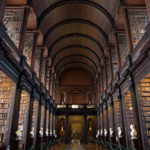In a widely discussed and very disheartening New Yorker piece this spring, Nathan Heller reported on the state of the English major and found it wanting. Perhaps the most alarming moment in the long essay came during an interview with James Shapiro, a professor at Columbia University and a prominent Shakespeare scholar, who confessed his doubts about the future of the English major based on his own declining reading habits. “I probably read five novels a month until the 2000s,” he told Heller. “If I read one a month now, it’s a lot. That’s not because I’ve lost interest in fiction. It’s because I’m reading a hundred Web sites. I’m listening to podcasts.” When even a prominent scholar acknowledges not only the difficulty of teaching literature to undergraduates, but also the decline of his own reading habits, the state of literary studies is dire.
In Professing Criticism: Essays on the Organization of Literary Study (The University of Chicago Press, 2022), John Guillory seeks to “be of service to literary study in negotiating its perennial crises, above all . . . the probable contraction of the literary disciplines in the face of overwhelming social and economic forces.” Guillory, the Julius Silver Professor of English at New York University, insists that to address this problem successfully, scholars must offer a better justification for “the continued existence of literary study in its avowedly highest form, as an organized research enterprise.” A major problem with the current defenses of the discipline is that they overstate its possibilities and relevance, “resort[ing] to a political fantasy” based on the unrealistic belief “that sophisticated and politically vigilant techniques of reading can have transformative effects vastly beyond the sphere of their practice.” And they overpromise in this manner because they are unsure about the true aim of their profession.
Professing Criticism is a thorough and complex work of scholarship. It’s also a bracing call for literary scholars to significantly reform how they think about their profession and its relationship to their students and the reading public in general. At its core is a challenge that is simultaneously reasonable and radical: professors of literary study must be more modest in their aims and promises to suit the realities of their field in the twenty-first century.
Professing Criticism is a thorough and complex work of scholarship. It’s also a bracing call for literary scholars to significantly reform how they think about their profession and its relationship to their students and the reading public in general.
Start your day with Public Discourse
Sign up and get our daily essays sent straight to your inbox.The Development of Disciplines
Although Professing Criticism is a collection of previously published essays rather than a linear argument, a handful of ideas run throughout. Several essays present brief histories of how the discipline of literary studies gained its present status in universities; these histories demonstrate that the discipline as we know it today is the result of centuries of change and adaptation. Guillory writes that “the history of Western education can be summed up with these two words: from arts to discipline.” (That’s four words, but you get the idea.)
A chapter about the conflict between literary critics and scholars of literary history is especially fascinating. After World War I, scholars moved away from philology—both because the discipline’s focus on scientific methods had become less important, and because its German roots were a source of embarrassment—and toward a method that approached “literary texts . . . more or less like other kinds of historical documents.”
Criticism, on the other hand, which previously had a strong presence in the world of journalism, sought to distinguish itself from the belletrism of previous generations by developing a more rigorous and systematic approach to interpretation and becoming “a discourse of knowledge” rather than of opinion. Eventually, the two camps reached a pax literature by combining the critics’ emphasis on close reading with the scholars’ reliance on historical periodization to establish the “composite discipline” that became known as literary criticism.
This postwar consensus eroded in the 1960s, when young professors redirected the focus of criticism from literature in particular to society in general. Eventually, they were able to professionalize this move, to give it the aura of scholarship, with a focus on topicality reflected by course or topic titles like, “The Politics of ——.” Although Guillory recognizes merit to this topicality, he objects to its kudzu-like encroachment on so much of the profession. What’s more, he observes that although it “seemed to open the discipline to new arenas of inquiry, it has also exerted a contrary pressure on the scope of the discipline, constraining its thematic categories to those that can be instrumentalized for the criticism of contemporary society.” Perhaps most importantly, though, this focus on social criticism “claims to wield an Archimedean lever” that can move the world—but that “lever has broken,” and the promises of radical change are empty.
In a particularly provocative passage, Guillory underscores the inverted relationship between the discipline’s relevance and its claims for itself:
Surely the political well-being of our society is better served by producing one informed, insightful, and habitual reader than by the publication of any number of scholarly essays and books, however devastating these might be as criticisms of society. The absurdity of the situation should be evident to all of us: as literary study wanes in public importance, as literature departments shrink in size, as majors in literature decline in numbers, the claims for the criticism are ever more overstated.
Readers may hear echoes of John Agresto’s warning in last year’s The Death of Learning that “the liberal arts have overpromised, or promised wrongly,” and his call “for some humility on our part.”
The Future of Literary Studies
Guillory contends that this overstatement of purpose is a result of the phenomenon of scholarly deformation: “all new learning is also the inception of new ignorance” that can misunderstand a discipline’s position in the broader intellectual world. (Or, as Guillory quotes Nietzsche, “every specialist has his hunched back.”) In the case of literary studies, deformation can only be overcome if the professoriate returns literature to the center of its work. That entails recognizing organizing principles apart from topicality, as well as understanding that the proper audience for their scholarship is not only other scholars but “readers of literature” more generally.
Straightening the hunched back of literary studies also means de-emphasizing publication as the primary outlet for sharing research. One problem with the publish-or-perish attitude is that it nudges young scholars toward quantity without due consideration for scholarly quality. Instead, Guillory argues, departments should recognize that teaching itself is a way of distributing knowledge—that is, a form of scholarship rather than a complementary professional activity. There are many virtues to this suggestion, not the least of which is that a renewed emphasis on teaching could improve the quality of classes and thereby attract more majors. For this to work, though, doctoral programs would probably need to provide more pedagogical training.
Guillory also invites literary scholars to reconsider some of the most prominent trends in their field, such as the ubiquitous call to decolonize the curriculum—that is, to displace white authors from the center of literary studies. Guillory understands that “English departments must accommodate themselves in some way to global literary production in the English language,” but he questions the appropriateness of the imperial metaphor. One problem with it is that it perpetuates the popular assumption among students that they should always see themselves in what they read. But encouraging students to read a work “that is not immediately relatable to their self-identification is one of the most important things we do.” The imperative also ignores that Global English is a “proliferating network, . . . a force that does not answer simply to the demands of the West.” (He refrains from attacking the metaphor for the most obvious reason, which is that it implies a pre-existing, indigenous canon that was overtaken by imperial literary interests.) Guillory prefers the alternative clarion call to democratize the curriculum! because it reflects the reality that “the English language interconnects populations in ways that exceed the effects of Britain’s colonial projects.” Unfortunately, it is still couched in the language of political activism, falling into the trap of topicality he warns us about elsewhere.
Guillory sees a future in which literary studies are divided into pre– and post–World War II tracks, the first of which “will become like the classics, in ways that we can hope will be as interesting as the classics are today,” and the second “dominated . . . by topics of identity and social justice.” Guillory never says so directly, but this intradisciplinary schism would repeat the major disruptions—from rhetoric to philology, from belles-lettres to criticism—that he charts in other chapters. There are other historical echoes. In many of Guillory’s proposals, he seeks to draw literary studies into the broader public in a manner that recalls the literary culture of previous centuries, and he calls for “a reassertion of judgment as the legitimate practice of all readers of literature—scholars, reviewers, students, and the reading public, whoever they are.” He also offers sharp observations about the culture of graduate school, which he describes as a “semi-autonomous professional sphere [that] might model a version of literary study beyond the career of college professor.” It’s a tantalizing—if a tad fantastic—vision of a return to a pre-professional model of literary culture.
Guillory sees a future in which literary studies are divided into pre– and post–World War II tracks, the first of which “will become like the classics, in ways that we can hope will be as interesting as the classics are today,” and the second “dominated . . . by topics of identity and social justice.”
As for readers outside the university, Guillory laments both that for them “reading so often falls to the level of ephemeral consumption” and in the absence of “intermediate sites or practices of reading, between the poles of mere entertainment on the one side and vigilant professionalism on the other.” Yet rather than condemn lay readers for their lack of vigilance, he admonishes scholars for their unrealistic desire to impose the standards and practices of their discipline on non-professionals. In a nod to Foucault, he proposes instead that even reading for pleasure is an “ethical practice” that can improve the practitioner. This improvement is not based on morality or transgressive politics, but arises because reading—like exercise, cooking, and sex—“enlarge[s] our experience and enrich[es] our sensibilities.”
I admire Guillory for his efforts to vindicate lay reading, but this strikes me as a shallow definition of self-improvement that raises the question of why this pleasure is worth experiencing. How does literature enrich our sensibilities, and what pleasures does it inspire, exactly? What kinds of books improve us the most? Similarly, when he elsewhere reasonably urges that “our discipline is, or should be, committed to developing the capacity to judge among readers of literature,” one wishes for detail about what this judgment entails, and on what standards it is based.
In the book’s final chapter, Guillory summarizes five rationales that constitute what he calls “the conceptual structures that underlie the discipline,” from its earliest linguistic/judicial purpose to the epistemic/disciplinary justification established in the twentieth century. Only in the very last pages does he divulge what he recognizes as the proper aim of literary studies. It is an admirable and compelling vision of cultural transmission: “to whatever extent we transmit scholarship to those we teach, we can reasonably claim to have enhanced their ability to understand literary works, to take pleasure in their works, and to comprehend how complex a literary artifact can be, how interconnected with its social environment, how much meaning can be condensed in how few words.” The virtue of this modest vision is that “it expresses a certain realism about the social effects of literary study” and avoids overpromising—and therefore disappointing student and scholar alike.
Then again, Guillory’s claim for literary studies is modest only when compared to the most ambitious promises of the past half-century. Guillory still believes that literary study “is foundational for all education,” and that those who love literature will recognize the excitement inherent in the understanding, pleasure, and comprehension he envisions. A scholar as learned and accomplished as Guillory should be taken seriously, but the question is whether his younger colleagues, the ones who will determine the future of the study, are likely to moderate the most inflated claims for their discipline. Is his vision enough to save literary study as an academic discipline? We should certainly hope so, but we shouldn’t overpromise.
The featured image is in the public domain thanks to Emily and pexels.com.
Important announcement: Introducing our new Ethics Advice Column! This week, submit your ethical questions to Chris Tollefsen, our expert in natural law philosophy and ethics. Each quarter, we will publish Chris’s responses to select questions.














